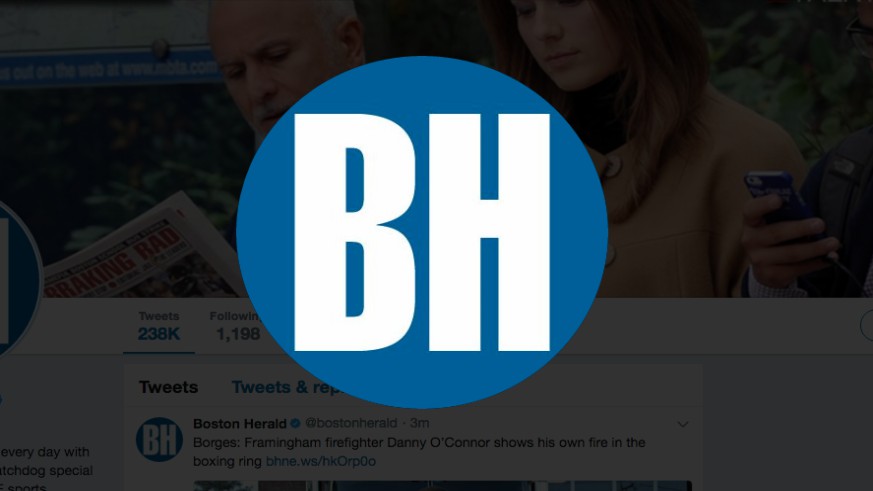Boston Herald employees hoping to stay with the company will soon have to apply for jobs within GateHouse Media after the newspaper was sold to GateHouse for $4.5 million last week.
GateHouse will trim the Herald staff from around 240 employees to around 175 in the coming months.
Depending on who you’re listening to or reading, the sale was either the nail in the coffin for the newspaper or a chance to start fresh. The majority of the commentary surrounding the sale around the city of Boston this weekend, however, has been negative.
10Dec.: GateHouse is more notorious than Gannett or McClatchy for buying news outlets, then slicing & dicing them with endless layoffs and cost cuts. And with the Herald already weakened by layoffs and cost cuts, I shudder to think what GateHouse will do: https://t.co/mwNF4Qgjs0
— Alex Philippidis (@AlexWestchester) December 10, 2017
GateHouse does not have a great reputation among journalists in the Northeast. Rarely do salaries – even for top editorial positions – climb over $55,000 per year – and staffs continue to shrink for most GateHouse papers.
In 2016, the largest union at the Providence Journal protested GateHouse management, citing skyrocketing salaries for top executives and the slashing of salaries for lower level employees.
From the Providence Newspaper Guild in May 2016: “While GateHouse boasts it’s sitting on $360 million in cash to buy more newspapers, and reserves the right to replace us with part-timers and temps, the hardworking ProJo staff has not been given a raise in 8 years and hasn’t had a contract in 1.5 years. GateHouse CEO Kirk Davis was given a 129 percent raise last year, from $917,000 in 2014 to $2.1 million in 2015. Projo workers haven’t had one since 2007 – and the same or more for our Brockton and Worcester units!”
The following is a GateHouse horror story from the industry site, SportsJournalists.com.
“Summer 2015, [the copy desk] were told their jobs were being eliminated and everything moved to the hub. But if you want your severance package, you can’t quit between now and October when we make the switch. October rolls around, they’re told the switch isn’t happening until after the first of the year … and you still can’t quit if you want that severance. I thought extending the deal was pretty [crappy] on their part. They basically held the local deskers hostage to keep them from finding other gigs.”
That said, nearly all newspaper companies in the U.S. these days have had similar stories coming out. In New England, GateHouse is widely regarded as a “bad company to work for,” but not quite as bad as a company like CNHI (based in Alabama), which has been forcing employees to take “furlough days” (requiring employees to take days off without pay) for nearly a decade.
“I just ended my employment at a GateHouse paper,” a commenter wrote on SportsJournalists.com in May 2016. “You could do worse, but GateHouse is basically copying everything from Gannett’s playbook down to the ‘if you don’t generate page views, you’ll be let go.'”
The Herald website has been a clear sore spot for the company for years. The design of the site is severely outdated and even when a reader clicks on a story on the site, they often encounter “the spinning ball of doom” with just how long it takes for a story to load.
In 2016, the Herald reported that it was getting 2.3 million monthly unique visitors to its site, a considerably low number for a major news outlet in a region which is home to around 14 million people.
Does Gatehouse Media have a working website? If so the Herald already improved their readership.
— Angry Brig (@AngryBrig) December 8, 2017
Biggest issue is that the Herald has the least user friendly website ever. Left behind. At least it sold for more than the globe #WorthlessBostonGlobeSoldForADollar https://t.co/ZYi5X3srwt
— Reece Joint (@reece_joint) December 8, 2017
So, there is some hope for the future of the Herald in some circles. Who knows, maybe GateHouse makes the Herald its crown jewel in the coming years? Stranger things have happened in this industry, and it may be too soon to refer to the Herald in past tense, like former GateHouse and Boston Globe executive Rick Daniels did last week.
“Certainly, as an independently owned newspaper, the Herald provided an amazing counterpoint to what the Globe did for many years,” Daniels told the Globe on Friday.
Loyal readers of the Herald and loyal employees of the Herald are all currently in “wait-and-see mode.”

























